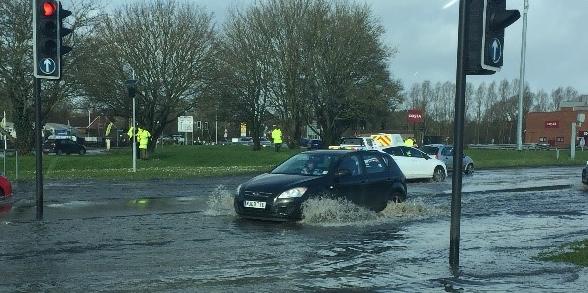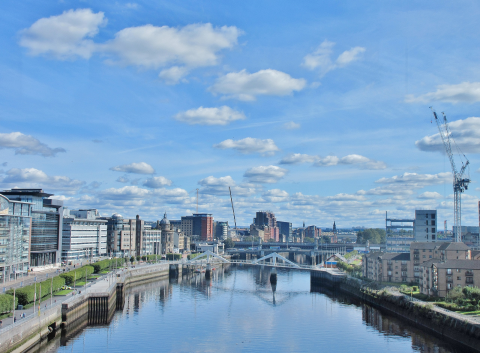 Professor Jason Lowe reflects on how the UK Climate Resilience programme is playing an increasing role in helping to better estimate risks from present and future weather and climate variability
Professor Jason Lowe reflects on how the UK Climate Resilience programme is playing an increasing role in helping to better estimate risks from present and future weather and climate variability
During the weeks of the COVID-19 lockdown an increasing number of the conversations I’ve had, both professional and personal, include a discussion of risk. Many people are reflecting on how to measure risk. Many more are thinking about how they balance risks and minimise the potential impacts on their everyday lives. I’ve spent a lot of my time in recent years thinking about a particular type of risk and the potential impacts – those involving climate variability and change.
Even this year we’ve seen notable damaging events. On 16 February 2020 there were amber weather warnings in place for much of the UK as storm Dennis approached and crossed the nation bringing very heavy rainfall and high winds. The Met Office weather warnings told me what to expect: fast flowing or deep floodwater, causing danger to life; homes and businesses were likely to be flooded; delays and some cancellations to train and bus services were likely, along with power cuts and loss of other services to some homes and businesses.
In Wales, the warning was upgraded to red, meaning dangerous weather was expected and people needed to take immediate action to stay safe. The impacts across Wales, but in the Rhonndda especially, were devastating, coming as they did only a week after storm Ciara crossed the UK. Ciara moved eastwards, reportedly killing several people in Europe. In the UK, there was damage from both the high winds and from flooding and the saturated ground then increased Dennis’s impact.

Winnersh roundabout 17th February 2020 following Storm Dennis
Extreme weather already impacting UK
The UK has tended to be more associated with floods than heatwaves, but the risks from heatwaves are changing too. The summer of 2019 saw a new temperature record set in Cambridge at 38.7°C and summer 2018 was the joint hottest for the UK as a whole and the hottest for England. The 2018 event led to a range of consequences, with the peak in temperatures coincident with a sharp increase in the daily death count for England and significant numbers of excess deaths. The reported impacts of the hot summer also included exacerbating some extensive and prolonged wildfires, such as those on Saddleworth Moor and Winter Hill.
Estimates have since been published showing that this exceptional summer was made around 30 times more likely by human-driven climate changes associated with greenhouse gas emissions. It is very clear that different types of extreme weather are having an impact on the UK. Many types of extreme weather are expected to become more severe and more frequent in the future as the global climate heats up, with the potential for casualties and other impacts to increase rapidly with them.
Changing future climate risks
The Strategic Priorities Fund (SPF) UK Climate Resilience Programme (UKCRP) exists to better estimate the risks from present day weather and climate variability, and to understand how those risks will change in the future. It will also provide new research to understand how to build resilience in the UK to cope with these risks and to recover from extreme weather events.
I became involved as ideas for a UK risk and resilience programme began to develop in late spring 2018, when the Met Office and NERC (Natural Environment Research Council) started discussions about how to work together on these issues in a new way. Quickly, other research councils joined in the discussions, then the Government department Defra joined.
We brought in other partners along the way, such as the Committee on Climate Change. Momentum was building but it was increasingly clear that, to make significant progress, a different type of programme was needed, one that brought together expertise from a wide variety of different disciplines all working together. The new Strategic Priorities Fund from UKRI (UK Research and Innovation) provided an opportunity to take forward these ideas and our successful bid for an £18.6million programme was confirmed in late autumn 2018. The UK Climate Resilience Programme began soon afterwards.
 With the help of an enthusiastic scientific steering group, two programme champions (Kate Lonsdale and Suraje Dessai, pictured) and with my colleagues at the Met Office we developed an integrated vision for the advances the programme needs to produce.
With the help of an enthusiastic scientific steering group, two programme champions (Kate Lonsdale and Suraje Dessai, pictured) and with my colleagues at the Met Office we developed an integrated vision for the advances the programme needs to produce.
New projects
The Science Plan forms the blueprint for how we will bring about a step change in research on risk and resilience, and how we can use climate services to deliver real benefits to the UK. Initially, the programme identified some of the most pressing questions we need to address. Over 20 projects were set up to begin research on these issues involving researchers from universities and other organisations across the UK and a growing team of researchers at the Met Office.
Some of these initial projects are now producing results, including helping us to better communicate uncertainty in climate risks (University of Leeds), and to understand public attitudes to risk and resilience in the UK (University of Cardiff).
Some are producing new estimates of the changes in risks that we can expect (University of Reading and UKCEH; UEA), including making new projections of flooding in the UK (University of Newcastle). Others projects are providing new thinking on how we might respond to these threats (University of Shefffield; UCL).
Currently, the UKCR programme is commissioning and starting up its next set of projects. I’ve had the exciting task of attending the start-up meetings of several of these. A group led by University of Reading has begun looking at how heat-related mortality in the UK will change, with new approaches to link these to shifts in the types of weather we experience.
A second project, led by Sayers partners, is developing a pioneering approach to combine the latest UKCP climate model projections with approaches from catastrophe modelling. A third project, led by JBA, is helping us understand how the UKCR programme can provide maximum benefits for the UK by feeding our results into design standards and good practice guidance for a range of different sectors.
In parallel, the delivery team at the Met Office has started to extend attribution approaches to more impact relevant metrics in order to quantify their probability in the present day, and has been analysing the possibility of multiple types of extreme weather impacts occurring at the same time.
Connecting with COP26
For those of us working on issues of climate change in the UK a big focus is COP26, the annual conference of the parties to the UN’s framework convention on climate change (UNFCCC). This year it was scheduled to be held in the UK in November, although it will now take place in November 2021 because of the impacts from COVID-19, and will provide an opportunity for the UK to show global leadership in both reducing emissions and building resilience.
The UK Climate Resilience Programme provides an important mechanism for developing and implementing a legacy of scientific advances in the run up to COP26 and beyond. It also provides a forum for considering if learning on vulnerability and resilience from our experiences with responding to COVID-19 can help our understanding of vulnerability and resilience to climate change.
Jason Lowe is Head of Climate Services at the Met Office Hadley Centre and Met Office Principal Fellow. He is also Chair of Interdisciplinary Climate Research for the Priestley International Centre for Climate.
For the UKCR programme, Jason is the Met Office Science Co-ordinator.

